May 27, 2025 | 01:06 GMT +7
May 27, 2025 | 01:06 GMT +7
Hotline: 0913.378.918
May 27, 2025 | 01:06 GMT +7
Hotline: 0913.378.918
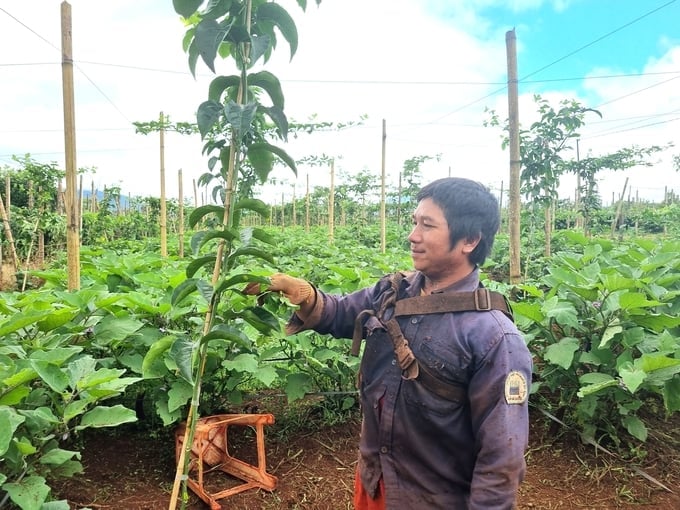
People no longer cultivate only passion fruit trees but choose intercropping. Photo: Tuan Anh.
Dak Doa district is one of the localities with a large passion fruit growing area in Gia Lai province with more than 700 hectares. Along the route from Nam Yang commune to Dak Krong commune (Dak Doa district), passion fruit gardens are planted in abundance but are mainly intercropped. Many intercropped passion fruit gardens are uncared, so the branches and leaves wither and the fruits are sparse. Besides, many families fear passion fruit will affect their main crops, so they dismantle the garden.
Mr. Bui Van Hiep’s family (village 1, Nam Yang commune) has more than 1 hectare of cultivated land, of which he spends more than 1,000 m2 to grow passion fruit intercropped with eggplant, and the rest to grow coffee.
Mr. Hiep said that a few months ago, seeing the price of passion fruit rising, his family planted nearly 200 trees, hoping to have more income. However, the price of lemons dropped, leaving his family little hope. Fortunately, besides passion fruit, Mr. Hiep planted more than 700 eggplant trees which generated high profit. However, the income from eggplant is enough for his family to make ends meet.
“At first, the family considered leaving the coffee garden to grow passion fruit but were afraid of unstable prices so they did not dare to invest. Although the income from coffee trees is not too high, it has brought a stable source of income for the family for many years,” Mr. Hiep shared.
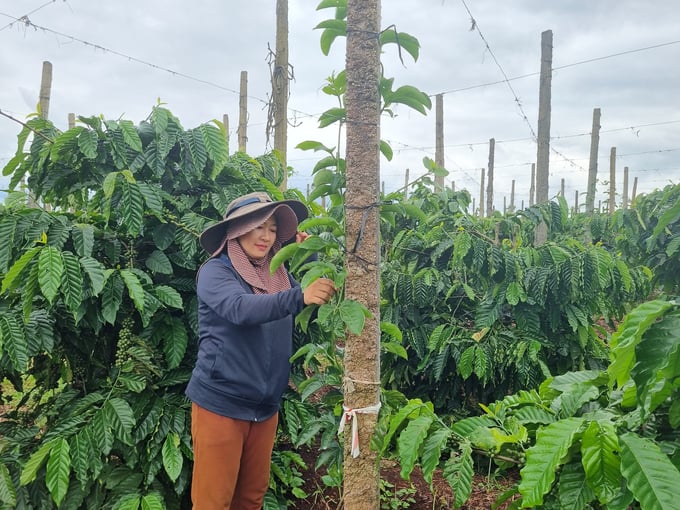
Ms. Oanh’s family (village 1, Nam Yang commune, Dak Doa district) uses pillars to intercrop passion fruit with coffee. Photo: Tuan Anh.
Not living far from Mr. Hiep, Ms. Nguyen Thi Oanh (village 1, Nam Yang commune) is cultivating a passion fruit garden intercropped with coffee. Ms. Oanh said her family used the available pillars to plant more than 300 passion fruit. It will take more than two months for passion fruit to be harvested, but with this situation, there is no hope of earning more income.
According to Ms. Oanh, because passion fruit prices continue to fall, no one in the area wants to invest money. Many families even dismantled passion fruit gardens to focus on coffee and pepper.
“Coffee trees are still considered the main crop here, so no one wants to replace this perennial crop to bet on passion fruit trees. Because passion fruit is only grown in coffee gardens, if the price drops, people are not too worried,” Ms. Oanh said.
Mr. Nguyen Kim Anh, Head of the Department of Agriculture and Rural Development of Dak Doa district, said that the price of passion fruit has dropped recently for many reasons, including the recent unfavorable weather – particularly flooding. On the other hand, with rising prices of fertilizers and pesticides, people are investing and caring for passion fruit sparingly. The development of passion fruit in recent times has mainly involved people taking advantage of intercropping due to the high price of passion fruit, then improving the land to re-cultivate coffee.
According to Mr. Anh, the current local trend is not to grow passion fruit on a mass basis but to grow it according to orders. For example, people sign contracts with large factories such as Quicornac or Nafoods to provide input services and stabilize product output.
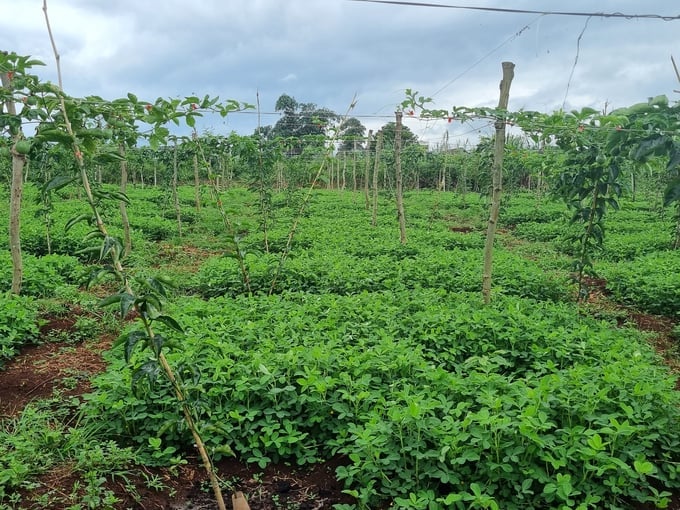
People have been intercropping passion fruit with legumes, which people are choosing. Photo: Tuan Anh.
On the other hand, some people are starting to produce passion fruit that meets European export standards. With the high price of passion fruit exported to Europe, only one or two batches will be enough to recover capital.
“People do not give up easily and still maintain growing passion fruit because the income is steady and stable throughout the year. Also, many purchasing and processing factories have appeared in Gia Lai province, so the market is still available,” Mr. Anh shared.
Mr. Doan Ngoc Co, Deputy Director of the Department of Agriculture and Rural Development of Gia Lai province, said that in reality, many passion fruit farmers still have a mindset with the primary goal of increasing productivity and output. They ignore product quality and market demand. Therefore, farmers must change their awareness and thinking and organize production according to market needs.
Mr. Phan Dinh Tham, Head of the Department of Agriculture and Rural Development of Ia Grai district (Gia Lai), said: “In the past when people dismantled old coffee trees to replant, we advised people to plant passion fruit to increase their income. At the same time, we also recommend that people should only plant passion fruit in their family’s existing coffee replanting area and should not massively expand the area."
However, with the price of passion fruit increasing too high, people still expand the planting area. The Department of Agriculture and Rural Development cannot prevent it because farmers have decided how to plant their gardens.
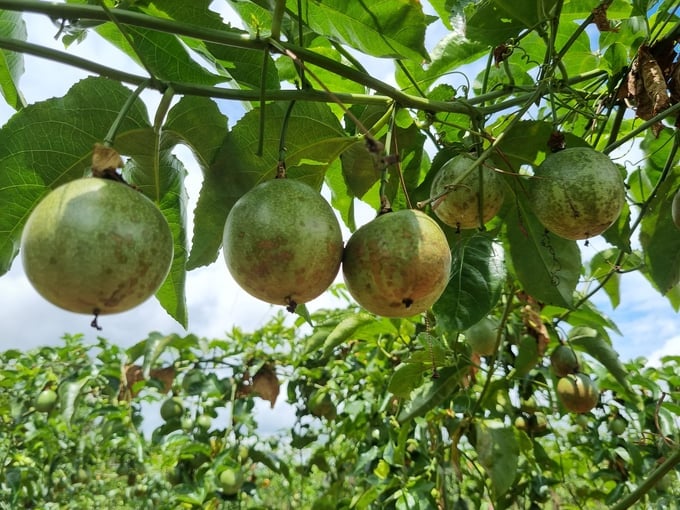
The area of passion fruit increased so rapidly that the quality of the fruit was not guaranteed. Photo: Tuan Anh.
Mr. Tham added that at the end of 2022, the district only had nearly 600 hectares of passion fruit. By October 2023, the area of passion fruit cultivation increased to 900 hectares. Thus, in a short time (between April and May 2023), the district’s passion fruit area quickly increased by more than 300 hectares. Of these, 200 hectares of passion fruit were planted from the need to replant coffee, while the remaining people replaced coffee and other crops to grow passion fruit.
Increasing the area of passion fruit too quickly in a short period of time without structure has led to the loss of market control.
Mr. Ro Cham Ve’s family in Bang village, Ia Nhin commune (Ia Grai district) said that when the price of passion fruit increased, people started growing passion fruits. With an area of nearly 5 acres, Mr. Ve’s family's passion fruit has been harvested, but the yield is only a few kilograms, and the income is only more than 1 million VND.
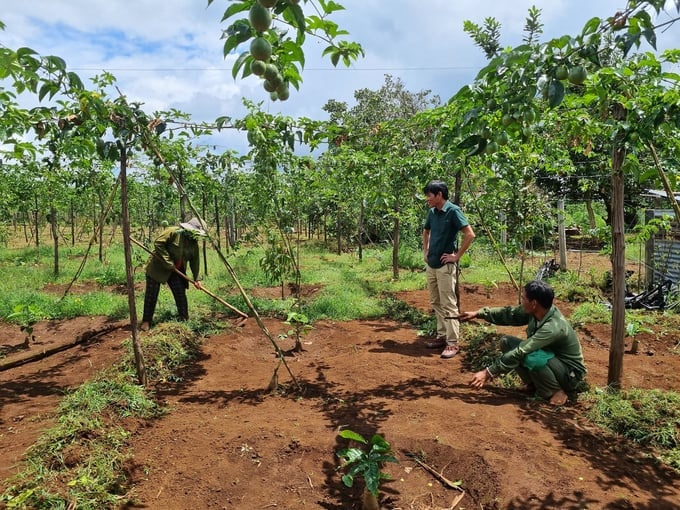
Many households grow passion fruit intercropped with replanted coffee in Ia Grai district. Photo: Tuan Anh.
According to the leader of a passion fruit production enterprise in Gia Lai, the area of passion fruit in the province is currently announced to be nearly 5,000 hectares. However, based on the reality of supplying varieties to the market and linking with households, the passion fruit growing area in Gia Lai province may now be up to 10,000 hectares. In particular, many passion fruit gardens are intercropped with coffee, pepper and other crops that the agricultural sector has not statistically recorded.
Faced with the situation of the passion fruit area increasing too rapidly, Gia Lai province’s agricultural sector has stepped up to raise awareness for people not to follow the trend of production.
Mr. Doan Ngoc Co, Deputy Director of the Department of Agriculture and Rural Development of Gia Lai province, said that people who produce passion fruit need to follow market orientation and local plans, as well as recommendations from specialized agencies. Instead of increasing area and output, farmers should focus on reorganizing production, linking and standardizing processes from cultivation and harvesting to storage, processing, transportation, and distribution of products.
People should not spontaneously expand passion fruit areas in unsuitable soil and irrigation conditions. At the same time, farmers should implement the farming process in the direction of using input materials economically and effectively, and implement flexible crop production according to market signals.”
In November 2023, Vietnam Agriculture Newspaper, the Department of Agriculture and Rural Development of Gia Lai province and related units under the Ministry of Agriculture and Rural Development will coordinately organize the Forum “Identifying the current situation of passion fruit production, processing and consumption, and Solutions to develop the sustainable passion fruit industry.” Within the framework of the Forum, the Campaign Committee of Gia Lai Province Passion Fruit Association will be launched. The forum will be livestreamed in Gia Lai province and broadcast to about 500 places nationwide.
Translated by Quynh Chi
/2025/05/25/4127-3-073637_820.jpg)
(VAN) Thanks to the promotion from an FAO-implemented project, vegetable production in greenhouses in Moc Chau has seen strong development, from 1.5 hectares in 2021 to nearly 50 hectares in 2024.

(VAN) FAO has recently supported USD 140,000 to implement the project 'Risk mitigation human-animal interface risks through disease control initiatives in pig farming.'

(VAN) The People's Committee of Tra Vinh province has approved an adjustment to the investment policy for the Green Hydrogen Plant project, increasing its area to approximately 52.76 hectares.
![Reducing emissions from rice fields: [2] Farmers’ commitment to the soil](https://t.ex-cdn.com/nongnghiepmoitruong.vn/608w/files/news/2025/05/05/dsc08881jpg-nongnghiep-140632.jpg)
(VAN) Clean rice cultivation model in Thuong Tan commune, Bac Tan Uyen district, is assisting local residents in achieving sustainable agriculture by substantially reducing costs, increasing productivity, and protecting the environment.

(VAN) At the conference to disseminate Resolution No. 68, AgriS introduced its digital agricultural ecosystem and reaffirmed its commitment to accompanying the Government in promoting private sector development and sustainable agriculture.

(VAN) 'Blue Ocean - Blue Foods' initiative is designed to restore marine ecosystems and establish sustainable livelihoods for local communities by cultivating a minimum of 1,000 hectares of cottonii seaweed in the first three years.
/2025/05/21/4642-3-112707_603.jpg)
(VAN) The V-SCOPE project has made direct contributions to three out of six pillars of the Comprehensive Strategic Partnership between Vietnam and Australia.